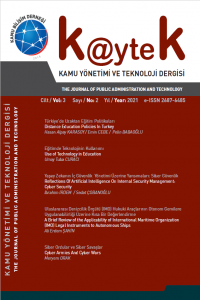Uluslararası Denizcilik Örgütü (IMO) Hukuki Araçlarının Otonom Gemilere Uygulanabilirliği Üzerine Kısa Bir Değerlendirme
Abstract
“Dijital Çağ” olarak da adlandırılan günümüzde, hemen hemen her sektörün değişim ve dönüşümünü teknolojik gelişmeler temelinde şekillendirdiği görülmektedir. Bu anlamda denizcilik dünyası da gemi yürütmeye ilişkin olarak öngördüğü otonom, yarı-otonom ve uzaktan kontrol gibi yenilikçi sistemlerle bu trendi takip etmektedir. Ancak yeniliklerin bu derece köklü olduğu durumlarda mevcut hukuksal çerçevenin daha önce öngörülmeyen meselelere ne şekilde cevap vereceğinin sınanması büyük önem arz eder. Bu çalışmada, insan unsurunun azaltılmasına dayanan gemi modelleri ve operasyonları tanımlandıktan sonra Uluslararası Denizcilik Örgütü'nün (“IMO”) yasal araçları olan SOLAS, COLREG, MARPOL ve STCW metinlerinin yeni sistemle çelişebilecek maddeleri incelenmiş, ardından uygulanabilirlik dereceleri kısaca değerlendirilmiştir.
Keywords
References
- International Convention for the Safety of Life at Sea, London, 1 November 1974 'SOLAS,1974'(Imo.org,) http://www.imo.org/en/About/Conventions/ListOfConventions/Pages/International-Convention-for-the-Safety-of-Life-at-Sea-(SOLAS),-1974.aspx
- International Regulations for Preventing Collision at Sea London, 20 October, 1972 'COLREG' (Imo.org,) http://www.imo.org/en/About/Conventions/ListOfConventions/Pages/COLREG.aspx
- International Convention for the Prevention of Pollution from Ships London, 2 November 1973 'MARPOL' (Imo.org,) http://www.imo.org/en/About/Conventions/ListOfConventions/Pages/International-Convention-for-the-Prevention-of-Pollution-from-Ships-(MARPOL).aspx
- Convention on Standards of Training, Certification and Watchkeeping for Seafarers 7 July 1978 'STCW' (Imo.org) http://www.imo.org/en/About/Conventions/ListOfConventions/Pages/International-Convention-on-Standards-of-Training,-Certification-and-Watchkeeping-for-Seafarers-(STCW).aspx
- Baatz Y. (2014) Maritime Law (3rd ed), Informa Law from Routledge.
- Cockcroft A, J Lameijer. (2004). A Guide To The Collision Avoidance Rules (6th ed.) Elsevier Butterworth-Heinemann.
- Hooydonk, E. (2014). The law of unmanned merchant shipping – an exploration. JIML, 20(1). 403-423.
- McLaughlin, R. (2011). Unmanned Naval Vehicles at Sea: USVs, UUVs, and the Adequacy of the Law. Journal of Law, Information and Science, 21(2), 100-115.
- Pritchett, P. W. (2015). Ghost Ships: Why the Law Should Embrace Unmanned Vessel Technology. Tulane Maritime Law Journal, 40(1), 197-226.
- Ringbom H., Collin F and Viljanen M. (2016). AAWA, Remote and Autonomous Ships: The Next Steps. Rolls-Royce plc. 35-54. https://www.rolls-royce.com/~/media/Files/R/Rolls-Royce/documents/customers/marine/ship-intel/aawa-whitepaper-210616.pdf
- Rødseth Ø. J. and Burmeister H-C. (2012). Developments Toward the Unmanned Ship. Semantic Scholar. 1-16. https://pdfs.semanticscholar.org/6a8a/771d52e210f36d48cd345a13aab294d83780.pdf
- Veal, R. (2017). Unmanned ships on the IMO work agenda. Lloyd’s Shipping & Trade Law. 17. 1-4.
- Buchholz K. (2018). Rolls-Royce Sets Sail with Autonomous Ship Technology. https://www.sae.org/news/2018/04/rolls-royce-sets-sail-with-autonomous-ship-technology
- CMI. (2018). International Working Group Position Paper On Unmanned Ships and The International Regulatory Framework Regulatory Framework. https://comitemaritime.org/wp-content/uploads/2018/05/CMI-Position-Paper-on-Unmanned-Ships.pdf
- Lloyd's Register. (2016). LR defines 'autonomy levels' for ship design and operation. https://www.lr.org/en/latest-news/lr-defines-autonomy-levels-for-ship-design-and-operation
- MUNIN, (n.d.). About. http://www.unmanned-ship.org/munin/about.
- MUNIN, (n.d.). The Autonomous Ship. http://www.unmanned-ship.org/munin/about/the-autonomus-ship
- Nordahl H and Rødseth Ø. (2017). Definition for Autonomous Merchant Ships. 1-21. https://nfas.autonomous-ship.org/wp-content/uploads/2020/09/autonom-defs.pdf
A Brief Review of the Applicability of International Maritime Organization (IMO) Legal Instruments to Autonomous Ships
Abstract
Nowadays, which is called the “digital age”, it has been seen that almost every sector shapes its change and transformation on the basis of technological developments. In this sense, the maritime world has followed this trend with innovative systems such as autonomous, fully autonomous, and remote-control, in order to operate ships. However, in cases where innovations are radical, it is of great importance to test how the current legal framework will respond to issues that were not foreseen before. In this study, after having defined ship models and operations based on reducing the human factor, the provisions of the legal instruments of the International Maritime Organization (“IMO”), namely, SOLAS, COLREG, MARPOL, and STCW that may conflict with the new systems were examined, and then the degree of applicability was briefly evaluated.
Keywords
References
- International Convention for the Safety of Life at Sea, London, 1 November 1974 'SOLAS,1974'(Imo.org,) http://www.imo.org/en/About/Conventions/ListOfConventions/Pages/International-Convention-for-the-Safety-of-Life-at-Sea-(SOLAS),-1974.aspx
- International Regulations for Preventing Collision at Sea London, 20 October, 1972 'COLREG' (Imo.org,) http://www.imo.org/en/About/Conventions/ListOfConventions/Pages/COLREG.aspx
- International Convention for the Prevention of Pollution from Ships London, 2 November 1973 'MARPOL' (Imo.org,) http://www.imo.org/en/About/Conventions/ListOfConventions/Pages/International-Convention-for-the-Prevention-of-Pollution-from-Ships-(MARPOL).aspx
- Convention on Standards of Training, Certification and Watchkeeping for Seafarers 7 July 1978 'STCW' (Imo.org) http://www.imo.org/en/About/Conventions/ListOfConventions/Pages/International-Convention-on-Standards-of-Training,-Certification-and-Watchkeeping-for-Seafarers-(STCW).aspx
- Baatz Y. (2014) Maritime Law (3rd ed), Informa Law from Routledge.
- Cockcroft A, J Lameijer. (2004). A Guide To The Collision Avoidance Rules (6th ed.) Elsevier Butterworth-Heinemann.
- Hooydonk, E. (2014). The law of unmanned merchant shipping – an exploration. JIML, 20(1). 403-423.
- McLaughlin, R. (2011). Unmanned Naval Vehicles at Sea: USVs, UUVs, and the Adequacy of the Law. Journal of Law, Information and Science, 21(2), 100-115.
- Pritchett, P. W. (2015). Ghost Ships: Why the Law Should Embrace Unmanned Vessel Technology. Tulane Maritime Law Journal, 40(1), 197-226.
- Ringbom H., Collin F and Viljanen M. (2016). AAWA, Remote and Autonomous Ships: The Next Steps. Rolls-Royce plc. 35-54. https://www.rolls-royce.com/~/media/Files/R/Rolls-Royce/documents/customers/marine/ship-intel/aawa-whitepaper-210616.pdf
- Rødseth Ø. J. and Burmeister H-C. (2012). Developments Toward the Unmanned Ship. Semantic Scholar. 1-16. https://pdfs.semanticscholar.org/6a8a/771d52e210f36d48cd345a13aab294d83780.pdf
- Veal, R. (2017). Unmanned ships on the IMO work agenda. Lloyd’s Shipping & Trade Law. 17. 1-4.
- Buchholz K. (2018). Rolls-Royce Sets Sail with Autonomous Ship Technology. https://www.sae.org/news/2018/04/rolls-royce-sets-sail-with-autonomous-ship-technology
- CMI. (2018). International Working Group Position Paper On Unmanned Ships and The International Regulatory Framework Regulatory Framework. https://comitemaritime.org/wp-content/uploads/2018/05/CMI-Position-Paper-on-Unmanned-Ships.pdf
- Lloyd's Register. (2016). LR defines 'autonomy levels' for ship design and operation. https://www.lr.org/en/latest-news/lr-defines-autonomy-levels-for-ship-design-and-operation
- MUNIN, (n.d.). About. http://www.unmanned-ship.org/munin/about.
- MUNIN, (n.d.). The Autonomous Ship. http://www.unmanned-ship.org/munin/about/the-autonomus-ship
- Nordahl H and Rødseth Ø. (2017). Definition for Autonomous Merchant Ships. 1-21. https://nfas.autonomous-ship.org/wp-content/uploads/2020/09/autonom-defs.pdf
Details
| Primary Language | English |
|---|---|
| Journal Section | Articles |
| Authors | |
| Publication Date | December 31, 2021 |
| Published in Issue | Year 2021 Volume: 3 Issue: 2 |

